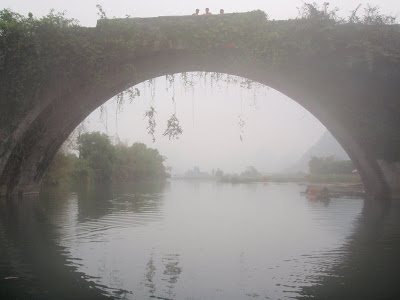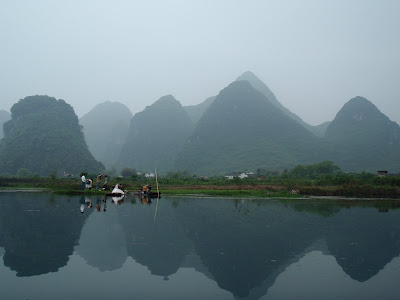
Everyone agreed that taking the train from Guiyang to Kaili would not be as "convenient" as taking the bus. The train station was "a little chaotic," the desk clerk at the hotel informed us. And besides, the bus left every hour.
The long distance bus station is on the fringes of Guiyang, seemingly an artifact of some master plan where the current city of Guiyang swells far beyond its current boundaries to some new, "modern" ring of villas and suburbs that haven't yet been constructed, that are only a dream on some central planning commission's drawing boards and the occasional aspirational billboard. The bus station has the same swooping curved roof as just about every Chinese airport constructed in the last few years, modeled after the archetypical Beijing Capital Airport Terminal 3 built for the Olympics. Inside, it's the same dull mat white walls, scuffed and smudged, grilled ticketing windows and truncated tubular crowd control fences, the less citified customers cutting lines wherever they can.
A helpful information officer led us over to the appropriate window to get tickets to Kaili. We were told to "mashang zou,"—our bus was leaving soon.
We made our way out the back, to where the buses waited.
Our bus: the most broken-down bus on the entire lot. Soiled doilies on the head rests. Seats that smelled like someone had spilled a bottle of baijiu on them—they reeked of stale alcohol.
Suspension? Shock absorbers? The bus laughed at such bourgeoise notions.

We traveled through a green, increasingly hilly countryside. The most striking thing to me were the graves. There are graves everywhere: grass mounds, mostly, some covered in gray stone, like Celtic cairns. All topped by flags on poles made of twigs: scraps of banners, shredded by wind, all white, with red bands. Later, we would see graves in the most unlikely places. Once, on the outskirts of Kaili, where autoshops and junkyards had been carved into the hills (the city of Kaili seems to have been created by blasting into granite mountains), there was a tiny copse that had somehow been left, surrounded by piles of auto parts, fenders and doors and stacks of tires, and there were graves there, too many, crammed into that tiny space. And I wondered, where were there families whose loved ones were buried here? Did they come to pay their respects, still? Did they sit on a pile of hubcaps to do so?

Some three to four hours later, we arrived in Kaili.
Kaili is the capital of the Miao/Dong minorities Autonomous Region in Guizhou, described by Lonely Planet as a jumping off point to visit villages without any great interest of its own. I liked Kaili. I couldn't tell you why, exactly; on the surface it looked like any other third-tier Chinese city. But there's something charming about it. Maybe the size: at about 500,000 people, Kaili is a small town for a Chinese city. Most likely, the people. Did I mention that, even though I hate making these kinds of gross generalizations, as a group, Guizhou people seem unusually friendly? I don't know how much of this was because we were foreigners visiting a place that didn't see all that many (we hardly spotted any Westerners our entire time there), or how much was due to the culture. According to the "Tourism Attractions of Kaili" book in my hotel room, around Kaili, "Every day is a festival. Every third day is a major festival." I kind of believe it.
For example: Richard, my traveling companion, had a minor injury that needed attention, and we decided to stop in at the Kaili First People's Hospital to see what could be done. It was close to 5 PM. The reception nurse walked us to the doctor's office. The doctor, who seemed impossibly young, let me hang out in the exam room, and later, took us upstairs to see his boss, who was just getting ready to leave for the day and had his eight year old son in the office. The son and I entertained each other (we determined that he wanted to be a jet pilot when he grew up, among other things), while the father put his white coat back on and attended to my friend. Afterwards, problem treated, he invited us both to dinner.
We declined. You know, stuff like that is awkward. Did he mean it? He seemed to.
So we had our own dinner to figure out. After a lot of fruitless wandering looking for a recommended night market, we finally hopped in a cab and asked the driver if he had any suggestions for dinner. He immediately brightened. "Have you been to the best Miao restaurant? You should try that!"
A short drive and we were there. To the left was what appeared to be banquet rooms for large parties: Miao women in traditional dress lined up at the entrance, along with Miao men holding the huge pipes used to play the old music. We went into the main restaurant. This was the only place in Kaili that we saw other Westerners, a Canadian (?) family with a tour guide. Even so, it seemed like it was still a big deal for foreigners to come in to dine. We attracted a lot of attention.
For example: after ordering (the recommended local beer, an amazing Miao tofu dish, some scallion pancakes, a superb cabbage-based soup), a man in his thirties approached our table and started chatting with us, a younger man trailing behind him.
He was a minor government official in some educational capacity, and at first we thought we were being hustled to take questionable English teaching positions (this happens a lot). The younger man was his fuwuyuan, specifically his driver. I offered them some beer—it seemed like the thing to do.
"I'm being presumptuous," he kept saying, "because I have been drinking. But I saw you and wanted to talk with you."
They sat for a while. He talked and asked the usual questions: Where were we from, how long had we been in China? Refused our offers of food but drank more beer (we kept them coming). Our waitress thought that he was pretty funny — "He likes to chui niu," she said a couple of times, a polite version of a phrase that means to blow your own horn. I didn't think he was really doing that, but it was hard to figure out just what it was that he did want.
Which turned out to be, to buy our dinner, which we found out after he finally did say goodbye.
The next day, we went out to visit some "minority" villages. We'd decided to splurge and hire a driver—it seemed the most effective use of our limited time (a note for travelers: Lonely Planet highly recommends the Kaili China Tourism Office, and they are right. Super-helpful folks). The driver, Mr. Ou, was not supposed to be a guide per se, just a driver, but for us, he was also the perfect guide, explaining just enough without going into some memorized spiel. Throughout the day, as we were driving and would see some spectacular spot, he'd say, "Do you want to stop and walk a while?" (we hired him again for Day #2) In many ways that was the best part of the experience—just walking through this spectacular scenery (I hope the photo essay below gives some sense of what it was like).
The biggest tourist attraction in the area is Xijiang—the Miao "Thousand Household Village." And there are some definite signs of tourist development there:

(ATMs, post office, cell phone cards and services readily available as well)
Still, I'd recommend Xijiang for a visit. The architecture is truly lovely (the top photo in the photo essay below is Xijiang), and I personally am a sucker for the Miao music. And the rice wine...


One last note...
As we left the village, riding in a convenient electric shuttle (yes, this is a fully developed tourism site), an older woman dressed in cargo pants and a baseball cap started chatting to Ou. "Are you their guide?" she asked. "Where are they from?"
"They're Americans," he replied, "and they speak Chinese."
She turned to us. Her accent was a giveaway, but we asked anyway. She was a Beijinger. "I'm traveling by car with my older brother," she explained. "We've been to Xi'an, to Kunming, to Guilin..." She grinned and gave a little shrug. "I'm retired, so why not?"
"That sounds like a lot of fun," I said.
"Where are you going next?" she asked. "Why don't you come with us, back to Beijing? We'll stop and visit Hunan. It's just the two of us; we have plenty of room!"
She seemed to mean it, too. Beijingers are also friendly folks, in my experience.
We'd already booked tickets to Kunming, and besides, it's such an awkward thing, to consider accepting a stranger's hospitality. But it was another one of those moments that made me glad I'd decided to take this trip.









































